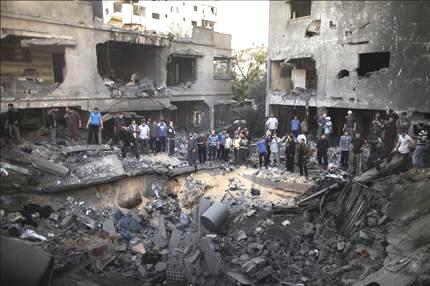AG confirms: Israel prevents Gazans' entry to attend court hearings in order to cancel compensation lawsuits against Israeli military
On 3 November 2014, the Israeli Supreme Court held a hearing on a petition filed by Adalah against the Israeli policy of preventing Palestinians from Gaza, who submitted compensation lawsuits for damages against the Israeli military, from entering Israel to attend their own court hearings. As a result of their absence or the absence of their witnesses from Gaza, the courts have cancelled their cases and have even ordered the payment of court expenses.
During the hearing, Adalah Attorneys Hassan Jabareen and Sawsan Zaher demanded clear written standards that organize and allow Palestinians from Gaza who submitted damage lawsuits and their witnesses to enter Israel to go forward with the judicial proceedings.
The Attorney General's response to the court concerning this practice reveals that the state, a party to the lawsuit, uses its power at the border crossings between Gaza and Israel to allow witnesses to enter only if their testimony does not harm the state's position.
Attorney Jabareen argued to the court: "The current situation is absurd, whereby a lawsuit is brought against the State of Israel, yet the state is also the party that decides who can access the courts and who cannot based on its own interest in the case. This practice undermines the possibility of obtaining a fair remedy before Israeli courts for plaintiffs from Gaza who were harmed by the Israeli military." Adalah stressed that the reasons given by the AG for denying entry to the plaintiffs are political and a conflict of interest, and are not based on any security considerations.
The petition was submitted in 27 September 2012 by former Adalah Attorney Fatmeh El-'Ajou. It is based on dozens of cases collected by the Al Mezan Center for Human Rights, in which some of the cases were closed in the Israeli military's favor, while other cases are pending in court. In one case, after the closing of a file in which the Palestinian plaintiff was not present because the army barred him from coming to court, the court ordered the plaintiff to pay 30,000 shekels in court expenses. In many other cases, the army only allowed witnesses to enter and not the plaintiff.
In addition to preventing plaintiffs and witnesses from accessing the court, Israeli authorities impose impossible conditions that prevent Palestinians from Gaza from submitting damage claims against Israel. For example, the law requires Gazans to submit a written complaint and their claim for damages to the Israeli authorities within 60 days of the occurrence of the incident in question, Israel then allows a maximum period of two years to submit the complaint to an Israeli court, which is too short a time for people with serious physical injuries, demolished homes or other severe effects of war. The cases are often dismissed on the grounds of that the statute of limitations precludes the case, if these conditions are not met. In addition, the Israeli courts require the plaintiff to pay large sums of money as a condition for submitting the damage claim in order to ensure court costs in the event that a court decision goes against him. For example, in one case, a family was told to provide more than NIS 1 million in order for the court to start judicial proceedings.
Read more:
Fatmeh El-'Ajou, Adalah briefing paper, "Obstacles for Palestinians in Seeking Civil Remedies for Damages before Israeli Courts", May 2013













